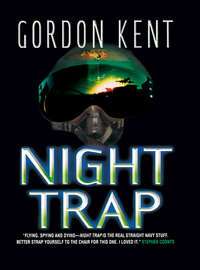
Полная версия
Force Protection
Her mother had got lost walking to the store, her father had said. She had been walking the route for twenty years. She worried that black people were coming into her house. He had found her nailing the windows shut.
Rose wrapped the lunches, hers and Mikey’s and the baby’s for day care. She flipped from channel to channel, looking for more news. Most of them had the story now, but CNN had the most, the best. Still, there wasn’t enough to know what was going on.
She worried. He could be dying. Dead.
She worried about him because he was a risk-taker, impetuous. A glory hound, some Navy people said. No. More like a poet with balls of steel – idealist, hardcase.
She had a tough day ahead. Two hours in the astronauts’ gym for VO2-Max and heart tests; an hour underwater in mock-zero-gravity, two hours hands-on on the engineering of the shuttle. Plus, just thrown at her by Mike Dukas, an obligatory half hour with NASA security to plan protection for her and the kids.
‘For what!’ she’d protested. ‘What am I being protected from, for God’s sake?’
Mike knew her temper and wasn’t phased by it. Mike was in love with her, but he wasn’t afraid of her. ‘From whoever blew up that ship, babe. Listen to me! The family of every man on that ship is going to get the same message today – maximum alert, get security, protect yourself! It’s Uncle’s standard OP when there’s terrorism.’
‘But why me? Mike, I’m up to my ass in work as it is!’
‘Because your husband’s on the ship now and because he put his face on TV for every goddam terrorist in the world to see. Babe! Trust me!’
‘Oh, yeah.’ She had pretended to argue, but she saw the point. If not for her, then for the kids. Dukas was to get on to NASA security as he soon as he had hung up from talking to her; she was to warn Mikey’s Camp and Bobby’s day care.
She wasn’t afraid for herself. But she’d kill to protect her children.
Reminded, she went back into the bedroom and slid open the drawer on her side. There, in a locked metal box, was her armpit gun, a Smith & Wesson Model 15. A revolver. Some guys had laughed at her for picking a revolver. But she liked the feel of it and the no-bullshit simplicity of it, and she liked the .38 Special plus-Ps that she shot in it. ‘Not a lady’s gun,’ the fat man in the gun shop had said to her when she bought it, and she had said, ‘I’m not a lady.’
She aimed it at a spot on the wall. The sights lined up as if they had been programmed. She dry-fired every day, hit a range at least once a week, shot fifty-yard combat courses for fun.
There’s an old saying: Be careful of the man – or woman – who owns only one gun. They’ll really know how to use it.
Two empty speedloaders were in the box with a carton of plus-Ps. She took them back to the kitchen and loaded them while she watched the news.
Nothing really new. Her husband was suspended in time and space, his three-fingered hand held out to the camera, trotting toward risk.
She worried. About him. About her mother. She didn’t even like her mother; what was she worrying about? Her father, whom she loved, and the effect on him? Or was the link to her mother too strong for ‘liking’ to even matter?
She worried.
She wanted to talk to her husband. She wanted to hear his voice. To know he was alive.
She went back to the television.
USS Thomas Jefferson.
Captain Beluscio’s voice sounded strangled with tension. ‘Now what?’
The comm officer had just been handed a message slip and was reading quickly. ‘A message from the Harker. “Mob action in city and at dock gates. Local fireboat hit by shoulder-fired missile or grenade. Recommend send no air or surface help until situation resolved. Signed Craik.”’
The captain stared. ‘Who the hell is that?’
‘Unh, the O-in-C of the S-3 det is named Craik. The guy they had to fly out of Pakistan a few weeks back, he lost part of his –’
Beluscio made an angry sound. Friend of Rafehausen’s. The chief of staff and Rafehausen were cat and dog – too close to each other in rank, with Rafehausen having only days of seniority; too different in temperament, the CoS tense, quick, Rafehausen laid back. And the two men too often treated as opposites by the admiral, who liked competition among his officers.
‘Craik,’ the chief of staff growled now. ‘I remember. What the hell is he doing in Mombasa?’
The other man dared to grin. ‘You can watch him on CNN, sir.’
Mombasa.
Alan duckwalked along a line of wounded men, six in all. Cook White had patched them up, but there was blood on the deck, and one man was pumping blood from an almost severed leg despite a tourniquet.
‘I got to get medical help!’ White was saying.
‘Nothing’s going in or out of the docks.’ He looked down at the blood that was spreading slowly over the chipped gray paint of the deck. ‘Anyway, we can’t use local blood. Navy policy.’
The black man stared at him. What Alan had said didn’t register. ‘They could send in a rescue chopper!’
‘Yeah, they could, if people weren’t shooting at us.’ He glanced back toward the dock, but the tilt of the deck hid everything; he saw only thin, gray cloud.
‘This man gonna die if he don’t get help!’
Alan gripped his big upper arm. ‘Save the ones you can save.’ That was the moment when he realized that they all might die there. It hadn’t occurred to him before – but here they were, cut off from the city, easy targets, with Alan the only shooter. He was carrying the sniper rifle himself now, because Jagiello, it turned out, had panicked and forgotten to take his safety off when the shooting started.
Alan looked up at the blown-out windows of the starboard wing of the bridge.
‘Patel!’
The dark head of the lookout appeared. ‘Sir!’
‘What’re the Kenyans up to?’
‘Very active in aid of finding the missile launcher! Twenty or more guys running about! Some shooting!’
Hansen had got on to the Kenyans twenty-five minutes before. Now, two hundred feet beyond where the Harker’s sloping deck met the water, the crippled fireboat, its radars shorn off and its deck littered with metal fragments, had stopped pumping water on the Harker but had stabilized itself. Alan had to be grateful for the hit on the fireboat, because, without it, the Kenyan Navy wouldn’t have come out.
Beyond the fireboat, a Kenyan Nyayo-class Thornycroft cruised slowly between the docks; beyond it, eighty yards from where he stood, he could see the tiny figures of Kenyan sailors swarming over an anchored dhow. He guessed that they were searching the ships there – too late – for more snipers and missile launchers.
It occurred to Alan that the hundred-foot Kenyan patrol boat carried a potent surface-to-surface missile that he hoped they wouldn’t decide to use in these close quarters. As if in answer, the boat could be heard to back its engines, bringing it to a stop, and at once a 20mm repeating cannon opened up. Instinctively, Alan ducked, but he heard the rounds hit behind him and knew that the Kenyans had solved the problem of the sniper in the warehouse: they had taken out what was left of every window in the wall – and the wall, as well. (And collateral damage beyond? he was thinking as he ran to a ladder and started for the bridge.)
It had turned out that the Kenyan Navy had a facility two docks down from where the Harker lay. They had gone on full alert when the explosion had gone off, putting their three boats to sea and hunkering down for some kind of assault, but they never explained why they had not at least sent somebody to gather intelligence on what had happened. Alan suspected some sort of wrangle between the Navy, a minor part of the Kenyan establishment, and the army, with the GSU thrown in on the army’s side. More to the point, perhaps, was the huge fuel depot that sat behind where he now knew the Navy installation was: they were guarding that, they said, because if the explosion that destroyed the Harker was repeated there, all of Kilindini, maybe all of Mombasa, could be afire. At least that was the explanation the government would give later, although by then there were rumors that somebody had ordered the Navy to stay in barracks to keep them from helping the Harker.
Alan ducked as he came out on the bridge’s wing. He glanced aside, saw the shattered roofline of the warehouse.
‘Done nicely,’ Patel said from the windowless bridge.
‘Very nicely.’
Alan went up one level to the communications space, where Hansen was still trying to patch in a secure transmission unit.
‘How you doing?’
Hansen had established a radio link to the Jefferson, but it wasn’t yet secure. Until he had secure communications, Alan couldn’t tell the CV anything but the bare bones of what was happening. He had been trying to raise LantFleet, Norfolk, on his cell phone again, but, as soon as he got somebody on the line, he’d lose the connection. He tried once more, waited two minutes, then gave it up. He laid the cell phone on Hansen’s table. ‘If they call back, tell them I tried.’
There was firing far up the dock. Presumably, the Kenyan sailors had found the missile launcher.
If they could secure the area – if, the Big If, and if the Kenyans would stay with them – he could call the Jefferson and tell them to fly in Marines and medics. It was an irony of the situation, of course, that when he could do that, they would already be more or less secure.
Twenty minutes later, Alan was heading below to check on damage control when a snappy-looking black man in a pale blue uniform shirt and body armor came striding over the deck toward him. He was smiling, but he was clearly not going to kiss any white man’s butt.
‘Ngiri, Maiko, lieutenant, Kenyan Navy.’ He gave a partial salute. ‘You are in charge?’
Alan nodded.
‘You are civilian?’
‘Craik, Alan, lieutenant-commander, United States Navy.’
‘Oh!’ Ngiri snapped to, really saluted, put on his helmet and fumbled with the chin strap. ‘Sorry, sorry, sir, they said this was a civilian ship –’
Alan waved all that away, pulled the man into the shade and relative privacy of a bulkhead. ‘What’s the situation up the dock, Lieutenant?’
‘Neutralized.’ He got the buckle fixed and snapped to again. ‘One shore party, under my direction, sent to neutralize missiles launched against our fireboat: mission accomplished, sir.’
‘What’d you find down there?’
‘Two Islamic terrorists, sir. One launcher, I think a bazooka. Bazooka?’
‘Yeah, could be – bazooka-type, yeah, could be one that hit your fireboat.’
‘And two surface-to-air missiles.’
Alan stared at him, stunned. A SAM could have taken out a helo – of course, that had been the intention. The explosion on the Harker was supposed to bring in help; the SAMs and the snipers would then destroy the help. Alan thought that through, then jumped back to something the lieutenant had said. ‘Islamic terrorists. You sure?’
The lieutenant smiled. ‘Nothing else they could be, sir. We have a so-called political party, the Islamic Party of –’
‘IPK, yeah, yeah –’
‘You know? Well, then!’ He squared his shoulders. ‘I am a Christian.’
Alan decided to let that pass. ‘You killed both of them?’
‘We did.’ With some satisfaction.
‘We’ll want to examine the surface-to-air missiles, if we may.’
‘They are the property of the Kenyan Navy, sir.’
Alan stared at him, nodded sharply. Embassy business. ‘Can you tell me what kind of SAMs, lieutenant? Country of origin, manufacturer –?’
Ngiri bristled because he did not know. ‘I am not an expert, sir. You must ask my superiors.’
Above, on the superstructure, Hansen was waving at him. ‘Come with me,’ Alan growled.
‘I have been ordered back to my base, sir.’
Out in the open water, the Kenyan patrol craft was still idling between the docks, its guns threatening the shoreline. Alan pointed at it. ‘Your guys are still out there. Hang on for a couple of minutes, okay?’ He guessed that Hansen had got his secure comm link at last. Could he now order in helos, with the possibility that a couple more SAMs were waiting somewhere in ambush? ‘Lieutenant?’
Ngiri’s face was blank. ‘I will ask my superiors.’
Alan started away, turned back. ‘What’s it like out there on the end of the dock now?’
‘Very quiet.’
‘Room to bring in a helicopter?’
Ngiri had never brought a helo in anywhere, he guessed. Still, the lieutenant said, ‘Oh, yes, maybe – perhaps –’
Alan took a step closer to the Kenyan. ‘Lieutenant, Mwakenya na mwamerika ni rafiki – kweli?’
Ngiri wasn’t taken in by the white-man-speaks-Swahili ploy. He lowered his head half an inch to acknowledge Alan’s feat, but he didn’t smile. ‘Yes, we are friends,’ he said, using English as if he was closing a door.
Alan didn’t give up. ‘Rafiki yangu, nitaka saidi yako.’ It was pretty bad Swahili, actually – he never could get those agreements of the prefixes – but it got across his plea for help. ‘Tafadhali.’ That meant ‘please.’ In Arabic, sucked into Swahili by the force of convenience on this coast that had been trading with Arabs for two thousand years.
Ngiri gave a flicker of a smile, held up a long, thin hand like an Ethiopian saint. ‘I will try.’
Alan started for the superstructure at a trot. He passed the wounded men sprawled in the shadows. The man who had been bleeding was dead.
Bahrain.
Harry O’Neill tried to ignore the knock on his office door. His house staff knew better than to trouble him when he was on the phone in his home office. He shuffled his slippered feet in annoyance.
The caller, a rich Saudi with a lucrative security contract to give, required careful handling, and any interruption of the conversation would almost certainly be taken as an insult. O’Neill, a black American with a security business in the Middle East, had learned to be careful with every nuance of courtesy.
‘Harry?’ Dave Djalik, ex-SEAL and Harry O’Neill’s best contract operative, was leaning in the door to his office.
‘Busy, Dave.’ Harry waved his hand and hardened his voice to convey the seriousness of the situation and went back to his telephone call.
‘Harry, you’re going to want to see this.’
‘I’m on the phone with an influential –’ Harry looked up and caught the expression on Djalik’s face. He leaned down to the phone and murmured an apology in Arabic. The response made him wince, and then he hung up. Djalik was already gone, and Harry followed him out of the office space in his house and through the foyer where a fountain played on ornamental rocks under a clear dome, and down a short hallway to the one room in Harry’s compound that held a television.
‘I’ve already watched it twice,’ Djalik said. He laughed.
On the screen, a slender man in shorts was climbing out on what appeared to be the derrick of a dockside crane. The yellow lettering at the base of the image said ‘CNN Mombasa, Kenya.’ The camera panned across wreckage and then back to the crane.
‘The man on the crane is unidentified, but CNN sources suggest that he is a member of the US Navy,’ a hushed voice from the television said. Djalik laughed again.
‘A member of the US Navy! Wait till you see who it is, Harry –’
One of the cranes was moving, the man on the derrick a passenger, the tension of his grasp on the supports around him clear even at a distance. The crane swung until its arm neared another crane, and the passenger was up and moving, jumping from one to another. A circle appeared around the man.
‘We think he’s firing here, Jean,’ one of the reporters said. In the background, Harry could hear somebody talking in French. The camera zoomed in, and he could see the man firing one-handed. Moments later, there was a close-up of the man as he walked along the dock, and Harry saw the man’s maimed hand and it all came together for him.
‘Alan Craik,’ he said aloud.
‘Bingo,’ Djalik said.
USS Thomas Jefferson.
Captain Beluscio stood in the Tactical Flag Command Center with his left hand on his hip, his eyes on a television screen that showed the CNN tape, right forefinger pressing a miniaturized headset to his ear. Listening intently to the headset, he was nonetheless giving orders to subordinates with his hands and eyes. Standing in front of him now was the Marine detachment commander, a wiry, muscled man whose short-sleeved shirt already revealed goose bumps on his arms from the frigid air-conditioning. Crew cut, scowling, the Marine looked like a boxer waiting for the bell. Beluscio held up a finger of his free hand to tell the Marine to hang on one more second.
Beluscio listened. ‘But –’ he said into the headset. ‘But –’ Then, ‘Goddamit, no, but –’
He threw his head back and rolled his eyes; clearly, somebody was really giving him an earful. He looked up at a wall clock. Reaching a hand forward as if he was going to touch the Marine captain’s cheek, he said softly, ‘Okay, suit up and join your boys. But nobody goes until I give the word!’
The Marine was gone as soon as he stopped speaking.
Beluscio glanced at the TV screen, now back to a talking head, and turned his attention again to the headset. ‘I know that, sir –’
He waved over an aide and murmured into his ear. ‘I want to know how fast Yellowjacket can put her Marines into Kilindini Harbor – at least a company.’ USS Yellowjacket was a Wasp-class gator freighter – a small aircraft carrier with VSTOL aircraft, choppers, and nine hundred Marines. Beluscio had decided to send the Jefferson’s Marines to Kilindini; the idea was that the helos could stay off the coast for at least an hour if need be, then divert to Mombasa airport if the landing zone was still hot. The chief of staff held the man from running off. ‘Tell them my Marines are on the way as advance guard; Yellowjacket is a lot farther away, and what I want to know is how fast they can be there in force, with logistics for at least a week. Go!’ He locked eyes with a female officer across the room and, eyes open in a question, mouthed the name: Craik? The woman shook her head, shrugged, palms up.
The captain swung around and pressed his whole hand against his ear and all but shouted, ‘No!’ He listened, eyes wide, mouth open. ‘I don’t care who you are, you’re not giving me that order! No!’
He gestured savagely at a lieutenant-commander a few feet down the space. He made equally savage writing motions; somebody pushed a message pad into his left hand. He was so angry that his handwriting became a tangle of points and edges as he wrote: Message to CNO URGENT. Get these assholes off my back! CIA – FBI – whoever!
He pushed the pad at the lieutenant-commander and returned to the headphone. ‘Sir, you do that! Go right to the White House! You tell them you’re going to override Navy authority in this area! I hope they ream your ass good. Until then, I’m in charge here, and I’m in charge of the situation at Kilindini! The Harker is Navy responsibility, and the Navy will investigate, and the Navy is in charge! Now get off my comm channel so I can do some real work!’
A sailor materialized in front of him. ‘Comm has a secure link with Lieutenant-Commander Craik on the Harker, sir.’
‘Well, thank God, finally –’
‘And, uh, sir, Captain Rafehausen is on channel four for you.’
Beluscio had an instant realization that everybody, even this sailor, knew of his and Rafehausen’s rivalry, and then he was on channel four and trying to sound neutral. ‘Captain Beluscio.’
‘Hey, Pete, Rafe. What’s the situation?’
‘I’m up to my ass in alligators, but everything’s under control, okay? We’re on top of it up here.’
‘What’s the word on the admiral?’
Beluscio hesitated. They were both thinking the same thing, he knew: if the admiral had been badly injured, the BG would need a new commander, and Rafehausen had the seniority. ‘Nothing as yet. We’re assuming that he’s alive and well until we hear otherwise.’
Then it was Rafehausen’s turn to hesitate. ‘Keep me posted, will you?’
Beluscio repressed a bitter answer and said something neutral. Switching channels, he snarled, ‘Get me this Craik – now!’
Washington.
Mike Dukas strode up the corridor toward his boss’s boss’s office, his face severe, hardly acknowledging the hellos and nods of passing people. The meeting he had asked for early this morning was going to take place three hours late. Not really his boss’s boss’s fault; he had been summoned to a meeting with the head of NCIS and reps from both the CIA and the FBI, and he had decided that meeting Mike Dukas was probably less important.
Dukas had spent his time finding out who was available to go with him to Mombasa and what sort of support he could hope for. He had tried to raise Al Craik half a dozen times on the supposedly international cell phone NCIS had given him, without success; two of the times, at least, Craik’s phone had been busy, so he was probably still alive. Otherwise, news from Mombasa was iffy, to say the least, that coming from the television increasingly so, as the stations went more to spin and less to simple fact. There had been a couple of long camera shots of the city, with distant smoke that the voice-over said was from the crippled ship, but who the hell knew how accurate that was? As with most TV news, what you had to look at most of the time was the newspeople themselves, who seemed to believe that they were really what was happening. Dukas had been particularly taken with a blond Brit who had worn a bush jacket and said he was broad-casting from ‘the edge of Mombasa city,’ although Dukas, who knew Mombasa a little, believed the guy was really at a tourist lodge about fifty miles away. Palm trees are palm trees, right?
NCIS had nothing in Mombasa. Neither had the Navy. The nearest presence was the naval attaché in Nairobi, and he didn’t seem to know squat until ten a.m. Washington time, when he called to say that ‘an asset on the spot’ said that there was rioting by the Islamic Party of Kenya, which the General Service Unit was putting down with maximum violence and minimum concern for human rights. (Actually, he hadn’t said the last part; that was what Dukas had added from his own experience.) The attaché added details over the next hour: hospitals filling; some people with gunshot wounds, a rarity in Kenyan demonstrations; firing heard from Kilindini, some of it described as machine guns; the dock area closed off; the big fuel dump by the docks safe so far. (The closing of the docks explained the end of the CNN coverage of the Harker, Dukas thought – also the disappearance of the French newsman who had tried to interview Alan.)
By eleven, Dukas was getting itchy. He wanted to go. He had even managed to get a tentative promise of a forensics team and an aircraft they called the Flying Trocar, an airborne forensics lab bundled into a 747. But only if he moved fast; in a few hours, somebody else would have a better claim on it.
Almost running now in his eagerness to get going, he nonetheless diverted from the straight path to Kasser’s office to put his head into one of the cubicles where the special agents spent their days when they weren’t on a case. A bright-looking, tousle-headed woman named Geraldine Pastner was sitting there, surrounded by photos of dogs.
‘You in?’ Dukas said.
She grinned. ‘Better than DC. We going for sure?’
He shook his head. ‘I’ll know in a couple minutes. Meantime, do me a favor? The clip on CNN – I want to know how they got it and who shot it. Get us a copy if you can, unedited if it’s available.’
‘Ask or order?’
‘Ask, ask, Jesus! We don’t want to get crosswise of them. Anyway, you can’t order media to give up sources, you know that.’









